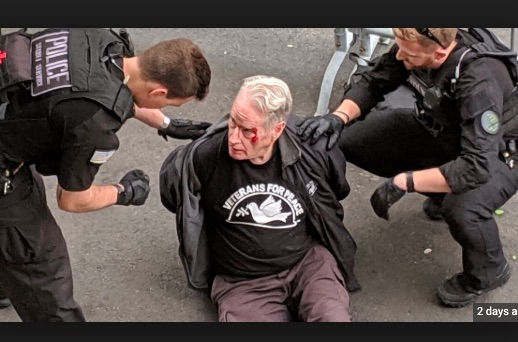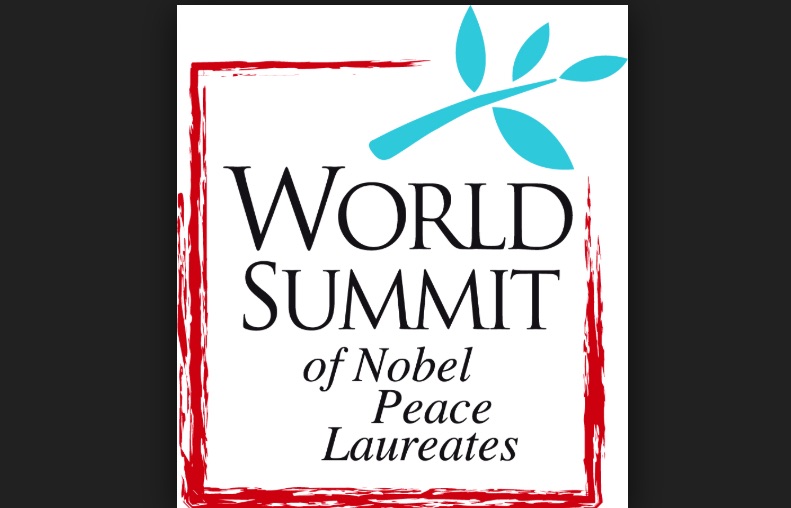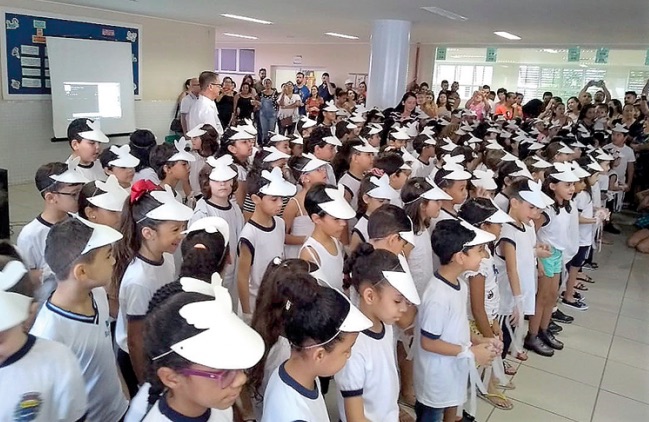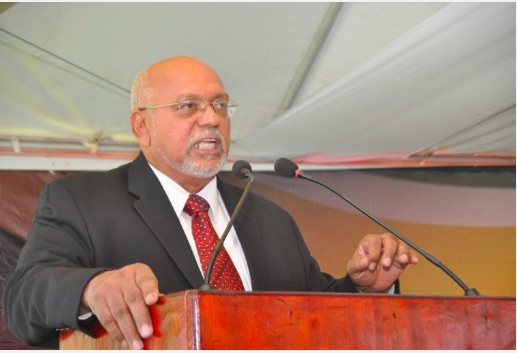…. HUMAN RIGHTS ….
An article by Jorge Martin in from Marxist.com
Millions participated in the general strike in Brazil on 14 June, with demonstrations in 380 cities across the country. The strike had been called to reject the proposed counter-reform of the pension system by the Bolsonaro government, but also reflected opposition to education cuts, which had already brought millions onto the streets on 15 and 30 May.

Image: Fora Bolsonaro
(click on image to enlarge)
The Bolsonaro government, already riddled with internal contradictions and rapidly losing support, was hit by revelations published this week of collusion between the judge and the prosecution in the trial against former president Lula. The judge involved was then awarded the Ministry of Justice by Bolsonaro. Far from being faced with the prospect of fascism, the government could be brought down by the mass movement, but for that to happen, more than a one-day general strike is required.
The general strike had been originally called by the trade union confederations on 1 May and was part of a very weak strategy centred around “putting pressure on the members of parliament” not to approve the law, rather than to defeat it with sustained mass pressure on the streets. The decision by the Bolsonaro government to introduce cuts in universities’ budgets and the provocative way in which it was done provoked a tsunami of indignation on the national day of strike in the education sector on 15 June, when 2 million participated in demonstrations against the government across the country. The movement of the students and teachers provided the necessary momentum for the general strike. A further national day of demonstrations, called on 30 May by the National Union of Students, saw hundreds of thousands march again against education cuts.
Meanwhile, the attempt by government supporters to call counter-demonstrations in defence of Bolsonaro on 26 May was a complete flop. In Sao Paulo and Rio de Janeiro, they barely managed to gather 10,000 each. On 15 May, anti-government protesters brought 250,000 to the streets of Sao Paulo and 400,000 in Rio. Not only were the 26 May demonstrations smaller, but their mood was not one of enthusiasm but rather of being on the defensive and in shock at the militancy shown by the youth on 15 May. The 26 May demonstrations had the aim of strengthening the government and Bolsonaro personally, in an attempt to appeal to “the people” directly above the heads of the parties and the parliament. They failed. The stage was set for the general strike.
According to the CUT trade union confederation, about 45 million workers participated in strike action. The strike was particularly strong in the education and the public sector, but also amongst bank workers, oil workers at Petrobras, public transport workers in the main cities, etc. In the industrial heartland of the Sao Paulo ABC, the metal workers’ union announced that over 98 percent of workers had struck, paralysing the main assembly plants of Volks and Mercedes and the auto-parts sector. 10 out of the country’s 12 refineries were paralysed, with workers not replacing their colleagues at the end of the night shift. The underground and bus services were either partially or completely paralysed in the main cities, despite the fact that there had been some court decisions banning some sections from going out on strike. The governor of Sao Paulo, João Dória, threatened to sack underground workers if they went on strike.
During the day, there were demonstrations and rallies outside the main workplaces as well as pickets. In the afternoon, hundreds of thousands came onto the streets in over 300 demonstrations across the whole country, including 50,000 in Sao Paulo, the same number in Porto Alegre and 100,000 in Rio de Janeiro, according to the organisers. The mood was very militant and the slogan “Fora Bolsonaro” (Bolsonaro Out!) caught on, despite attempts by the leaders of the left and the trade unions to limit themselves to demand the resignation of Justice Minister Moro. The demonstrations could have been bigger had it not been for the role played by the trade union leaders, which did their best to prevent militant demonstrations in the streets. The CUT’s president Vagner Freitas openly called on workers “to stay home” as part of the general strike.
Masses react against attacks
The strike was preceded by revelations published by The Intercept of improper conduct by the judge and state prosecutors during the trial of PT leader for corruption, with the aim of preventing him, first from being a candidate in the presidential election when he was first in the opinion polls; and then from giving any public interviews from jail, which could have influenced the election result.
This is a major scandal, which puts into question not only the validity of Lula’s trial, in which he was sentenced to jail for corruption without any evidence, but also questions the legitimacy of the presidential election itself. Had Lula been allowed to stand, it is likely that he would have gone on to win the presidency. Furthermore, the scandal affects Judge Moro, who presided over the trial against Lula and was then rewarded with the Ministry of Justice in Bolsonaro’s government, as well as being promised a seat in the Supreme Court. The latest revelations in this scandal show how Judge Moro, who was supposed to be neutral and impartial, told the prosecution to issue a press statement to rebut the arguments of Lula’s defence team. Despite the fact that he is still the most-popular member of the government, the number of people who have a positive opinion of him has fallen sharply from 60 to 50 percent over these recent leaks, adding to the ailments of the Bolsonaro government, which has just seen another of its ministers being sacked.
The pensions counter-reform is a major part of the anti-working class offensive, which the ruling class needs to implement and is being spearheaded by ultra-liberal Finance Minister Paulo Guedes. If implemented, it would be a major setback, increasing the retirement age for both men and women, as well as increasing the necessary contributions. It would have a particularly negative impact on public sector workers. The counter-reform has become very unpopular, including amongst many who voted for Bolsonaro. Furthermore, it faces a number of important hurdles in its parliamentary procedure before it can be approved. Let us remember that Bolsonaro’s party does not command a majority in the lower house, which despite being dominated by bourgeois parties, is not to keen to bear the responsibility for such a brutal attack.
(Article continued in the right column)
Questions related to this article:
How effective are mass protest marches?
(Article continued from the left column)
The congressional committee report on the pensions proposal included a number of minor concessions, for instance regarding the basic state pension, the pension system for workers in rural areas and even put into question one of the central ideas of Guedes proposal such as the move to individual private savings accounts. The idea behind this move by the “centre” bourgeois parties in parliament is to make some minor amendments to Guedes’ plan in order to bring the PT governors from the north-eastern states on board in accepting the basic principle of the need for a “reform” of the pension system. These governors, from the PT and the PCdoB, had issued a letter asking to be included in the negotiations of the pensions “reform”. According to some calculations, the congressional plan would reduce the amount of cuts involved from R$1.2 billion to “just” R$850 million. Nevertheless, the central aspects of the counter-reform remain, increasing the retirement age, as well as the amount of contributions workers will have to pay. The manoeuvre by Congress was also aimed at dividing the workers and weakening the impact of the general strike. Guedes reacted angrily to these proposals and threatened to resign if his original plan was not approved. The pension counter-reform law is supposed to be put to a final vote before the parliamentary recess at the end of July.
Bolsonaro government weakening
The Bolsonaro government is riddled with all sorts of internal splits and divisions, with at least three major factions fighting each other publicly. The struggle against education cuts and the attacks on pensions have provoked a steep decline in its popularity. Those who think that the government is bad or very bad have increased from 22.5 percent in February to 37.4 percent now, while those who think the government is good or excellent have declined from 38.7 percent to 30.4 percent.
Any hope that an economic recovery would prop up Bolsonaro has quickly evaporated. Figures for the first quarter of 2019 reveal an economic contraction of -0.2 percent, the first one since the end of the recession in 2016. As well as the international slowdown hitting Brazil’s extractive sector (-6.3 percent), the country’s car industry has been hit by the recession in neighbouring Argentina. Overall, industry fell by 2 percent in the first quarter. Unemployment has barely decreased and remains at 12.7 percent (30 percent amongst the youth), a total of over 13 million unemployed.
All indicators are down. Capitalists are no longer happy with the government, which is proving unable to move fast in implementing the policies the ruling class demands and risks provoking a social explosion on the lines of the 2013 June days. A survey of “money managers, economists and traders” carried out by XP Investimentos showed how approval of the Bolsonaro government had fallen to 14 percent in May, from a high of 86 percent in January, while those rating it as bad or awful had risen to 43 percent, from 1 percent!
At a certain point, if Bolsonaro becomes too unpopular and is unable to implement the programme the capitalists need, they might consider the option of replacing him with the more “moderate” and “reasonable” figure of his vice-president Hamilton Mourão, from the government’s “military wing”.
Faced with such a weak and divided government it would be perfectly feasible to defeat the pensions counter-reform and also bring the government down. That would require a fighting leadership, which neither the leaders of the left organisations nor those of the trade unions are providing.
Fora Bolsonaro!
They were in shock when Bolsonaro won the second round of the presidential election, an outcome they were unable to understand. The leaders of the PT and the CUT reacted by raising a hue and cry about “fascism” having come to power. This was completely false and only served to cover their own cowardice in organising the struggle against the government. Bolsonaro’s government is reactionary and he is a dangerous, far-right demagogue with Bonapartist aspirations. But what we have in Brazil is not fascism, which would imply a reactionary government able to mobilise mass support amongst the petty bourgeoisie in order to physically suppress the workers’ organisations. On the contrary, what we have seen on 15 and 30 May, and above all yesterday during the general strike, is a powerful mobilisation of the working class and the youth and Bolsonaro’s failure to counter it with a mass movement on the streets on 26 May.
From this wrong political appraisal, the leaders of the PT and the CUT draw the conclusion that the situation is bad, Bolsonaro has mass support and therefore the slogan “Bolsonaro Out” is out of order. In this they are joined, unfortunately, by the leaders of the PSOL and the majority of the ultra-left sects. While the PT and CUT leaders argue that Bolsonaro was democratically elected (!!) and should be allowed to finish his term of office, the ultra-left sectarians argue that the slogan is premature and pointedly refuse to raise it. Both reformists and ultra-lefts are united in their lack of confidence in the working class.
Leaders of 10 different parties met on 20 May in an attempt to organise a “cross-party front” against Bolsonaro. The meeting included bourgeois parties, as well as representatives from the PT, PCdoB and PSOL. As is always the case in these popular fronts, the programme was watered down so much as to mean almost nothing. There was no agreement in opposing the pensions counter-reform, which the bourgeois parties support. The demand therefore was dropped from the common front. There was no agreement on a basic, simple, democratic demand “Lula Livre”, so this was dropped.
One thing they all agreed on was… to reject the slogan “Fora Bolsonaro”. This was also the line coming from Lula, who is still in jail. The arguments are surreal. Some say that the slogan could be interpreted as a slogan in favour of Vice-President Mourao! Others argue that there should be legal grounds for demanding the impeachment of Bolsonaro, but the mass demonstrations in the streets don’t want to impeach him, they want to overthrow him!
At the meeting, PT leader Haddad insisted that the opposition agreement should be broadened in order to get the support of the centre and the “liberal centre-right”. The leader of the PCdoB parliamentary group was very pleased with the meeting and said that “we must fight against sectarianism in Brazilian politics”! At a separate meeting of left parties, involving the PT, PSB, PCdoB, PDT and PSOL on 22 May, they agreed not to raise the demand Fora Bolsonaro, despite the pressure coming from the 15 May demonstrations.
The comrades of the Esquerda Marxista (Brazilian section of the International Marxist Tendency) have intervened since the beginning of the movement raising precisely the idea that the government can be defeated by a mass united movement of the working class. This idea can be summarised in the slogan “Fora Bolsonaro”. Defeating Bolsonaro, they argue correctly, would require not just a 24-hour general strike, but the preparation of indefinite strike action with the aim not only of defeating the pension counter-reform but of bringing down the government.
The general strike on 14 June showed the willingness to struggle by workers and the youth. If they had a leadership up to the task, the Bolsonaro government would be counting its days.









